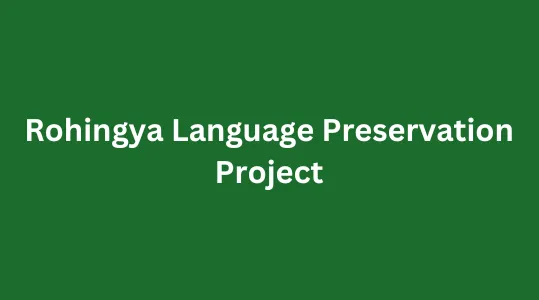First They Targeted Our Culture and Language: Threats to Rohingya Language, Culture, and Identity in Myanmar and Bangladesh
16 November 2022

Executive Summary
A people are defined by and remain “a people” because of and through their language and culture. If their language and culture are erased, that reality also contributes to and reinforces the various physical acts of violence that seek to “destroy, in whole or in part, a national, ethnical, racial or religious group” which are enumerated in the definition of genocide in the Genocide Convention. The killings and other horrific violence go hand in hand with the cultural and linguistic repression, and together they aim to “destroy” a people, leaving nothing and no one behind.
In recent years, the majority of the attention dedicated to the Rohingya crisis has understandably focused on physical violence and destruction, including killings, rape and the burning of villages in Myanmar. However, very little consideration has been given to the violence that has been employed against Rohingya culture. For decades, the former Myanmar governments and the current junta have suppressed Rohingya cultural expression with the intention of eroding Rohingya cultural identity. Even now, five years on from the genocidal attacks conducted by Myanmar’s military, 900,000 Rohingya continue to experience the attrition of their language and culture, as they live in exile in the refugee camps in Bangladesh. The restrictions imposed on Rohingya refugees by the Government of Bangladesh exacerbate the damage to Rohingya culture and identity that was initiated in Myanmar. It is within this context that this participatory research was conducted, in hopes of understanding Rohingya perceptions on the state of their language and the intersection of language, culture, identity, and rights.
This report presents results from mixed methods research. Data was collected through 285 individual interviews with randomly selected Rohingya respondents in the refugee camps in Cox’s Bazar and on Bhasan Char Island. This Rohingya-led, participatory research was conceptualised, planned and executed by a team of 23 Rohingya researchers.
This report provides new and important findings, including the following:
- Rohingya language plays a critical and central role in Rohingya cultural identity
- Rohingya language is currently changing as Rohingya assimilate to the Bangladesh context
- Rohingya language–and therefore Rohingya identity–is at-risk for the Rohingya population in Bangladesh, as our language continues to disappear
- Maintaining a distinct Rohingya identity is seen as important to increase legitimacy and rights upon return to Myanmar
- Preservation of Rohingya language and identity among Rohingya communities in the camps is extremely important both for existential reasons and to increase the likelihood of a return to Myanmar with legitimacy and rights
The findings in this report provide important information that should be utilised by 1) our Rohingya community as we work for language, cultural and identity preservation. Additionally, these findings have implications for 2) humanitarian organisations, who should position Rohingya-speaking staff in roles that interface with the refugee community and ensure the use of Rohingya language–not Chittagonian–in all programs. 3) The National Unity Government (NUG) now resisting the junta who took over in the February 1, 2021 coup, must urgently recognise the Rohingya ethnicity and remove practices and policies aimed at Rohingya cultural destruction. 4) The Government of Bangladesh must remove restrictions on Rohingya cultural events, freedom of movement, and the ability to work in the camps. 5) Lastly, the international community must exert pressure on both the current junta and the Government of Bangladesh to remove extreme restrictions that contribute to the repression and destruction of Rohingya culture.
Our hope is that these findings will demonstrate the great importance that the Rohingya community places on preserving Rohingya language, culture and identity. Additionally, we hope that our community living in the refugee camps will respond to these findings by placing a greater emphasis on using Rohingya language within the community and in conversations with family and friends. Working together with our international partners and allies, we hope to preserve the Rohingya language as we await a dignified return to Myanmar’s Rakhine State in the future.
Announcements
21 May 2025
Open letter: Malaysia must lead ASEAN with principle, not hypocrisy, to address the Myanmar crisis

Progressive Voice is a participatory rights-based policy research and advocacy organization rooted in civil society, that maintains strong networks and relationships with grassroots organizations and community-based organizations throughout Myanmar. It acts as a bridge to the international community and international policymakers by amplifying voices from the ground, and advocating for a rights-based policy narrative.